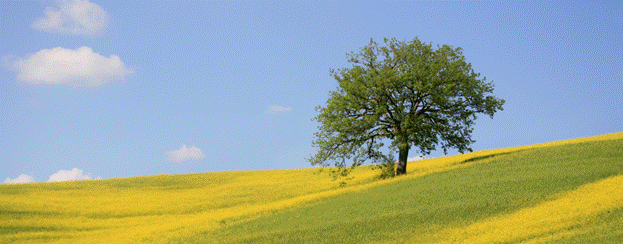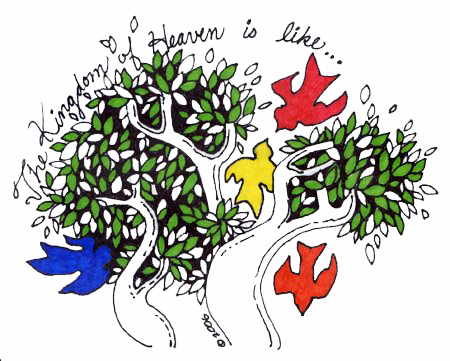'Round the Table' Family Catechesis
Miracle Maker (15)
SUBJECT: Miracle Maker
“Miracle Maker” movie:
https://gloria.tv/media/TGhhMLQCx3E
Parable of the Mustard Seed (20.50-21.30)
Mark 4:30,32
Matthew 13:31,32
Luke 13:18,19
DOCTRINAL POINT:
- The mysterious growth of the Kingdom of Heaven
DIRECT AIM:
- To nourish wonder about nature starting with something very small and becoming large or great (seed to tree)
- To introduce the idea about the Kingdom of God.
INDIRECT AIM:
- Spiritual growth made personal and conscious for the child
- To become aware that life and creation have power that is beyond our control
PRESENTATION:
During Christmas we tried to describe two different kingdoms. What did Herod have as king – servants, army, fine clothes, castle, power, land. Jesus’ kingdom – no palace, no royal robes. Jesus told many stories when he was grown up about the Kingdom of Heaven. The Kingdom of Heaven is like a mustard seed which at the time of its sowing in the soil is the smallest of all the seeds on earth. (See below a picture of a mustard seed).

Yet once is sown it grows into the biggest shrub of them all, (See the picture of the mustard seed below):

and puts out big branches so that the birds of the air can shelter in its brunches.

Read Mark 4:30,32
RESPONDING TO GODS WORD:
Where does the seed get energy to grow so much?
I wonder how the birds feel about this tree?
I wonder where the birds were coming from?
I wonder if the birds were happy to find such a tree?
I wonder where could a tree like this grow?
Invite children to prayer and to draw in response to what they have heard.
FOR PARENTS:
Every time we pray “Our Father” we ask for “…Your Kingdom come, Your will be done on earth as it is in heaven.”
Below are fragments from blessed John Paul II Encyclical Letter REDEMPTORIS MISSIO,
“On the permanent validity of the Church's missionary mandate” about the Kingdom of God.
http://www.vatican.va/holy_father/john_paul_ii/encyclicals/documents/hf_jp-ii_enc_07121990_redemptoris-missio_en.html
“The kingdom which Jesus inaugurates is the kingdom of God. Jesus himself reveals who this God is, the One whom he addresses by the intimate term "Abba," Father (cf. Mk 14:36). God, as revealed above all in the parables (cf. Lk 15:3-32; Mt 20:1-16), is sensitive to the needs and sufferings of every human being: he is a Father filled with love and compassion, who grants forgiveness and freely bestows the favors asked of him.
St. John tells us that "God is love" (1 Jn 4:8, 16). Every person therefore is invited to "repent" and to "believe" in God's merciful love. The kingdom will grow insofar as every person learns to turn to God in the intimacy of prayer as to a Father (cf. Lk 11:2; Mt 23:9) and strives to do his will (cf. Mt 7:21).
Characteristics of the Kingdom and Its Demands
14. Jesus gradually reveals the characteristics and demands of the kingdom through his words, his actions and his own person.
The kingdom of God is meant for all mankind, and all people are called to become members of it. To emphasize this fact, Jesus drew especially near to those on the margins of society, and showed them special favor in announcing the Good News. At the beginning of his ministry he proclaimed that he was "anointed...to preach good news to the poor" (Lk 4:18). To all who are victims of rejection and contempt Jesus declares: "Blessed are you poor" (Lk 6:20). What is more, he enables such individuals to experience liberation even now, by being close to them, going to eat in their homes (cf. Lk 5:30; 15:2), treating them as equals and friends (cf. Lk 7:34), and making them feel loved by God, thus revealing his tender care for the needy and for sinners (cf. Lk 15:1-32).
The liberation and salvation brought by the kingdom of God come to the human person both in his physical and spiritual dimensions. Two gestures are characteristic of Jesus' mission: healing and forgiving. Jesus' many healings clearly show his great compassion in the face of human distress, but they also signify that in the kingdom there will no longer be sickness or suffering, and that his mission, from the very beginning, is meant to free people from these evils. In Jesus' eyes, healings are also a sign of spiritual salvation, namely liberation from sin. By performing acts of healing, he invites people to faith, conversion and the desire for forgiveness (cf. Lk 5:24). Once there is faith, healing is an encouragement to go further: it leads to salvation (cf. Lk 18:42-43). The acts of liberation from demonic possession-the supreme evil and symbol of sin and rebellion against God-are signs that indeed "the kingdom of God has come upon you" (Mt 12:28).
15. The kingdom aims at transforming human relationships; it grows gradually as people slowly learn to love, forgive and serve one another. Jesus sums up the whole Law, focusing it on the commandment of love (cf. Mt 22:34-40; Lk 10:25-28). Before leaving his disciples, he gives them a "new commandment": "Love one another; even as I have loved you" (Jn 13:34; cf. 15:12). Jesus' love for the world finds its highest expression in the gift of his life for mankind (cf. Jn 15:13), which manifests the love which the Father has for the world (cf. Jn 3:16). The kingdom's nature, therefore, is one of communion among all human beings-with one another and with God.
The kingdom is the concern of everyone: individuals, society, and the world. Working for the kingdom means acknowledging and promoting God's activity, which is present in human history and transforms it. Building the kingdom means working for liberation from evil in all its forms. In a word, the kingdom of God is the manifestation and the realization of God's plan of salvation in all its fullness.”

 English
English  Polski
Polski